Today we hear the Gospel of Luke, chapter seven.
Jesus says to us: “Do not weep!” And then he says, “I say to you, arise!”
We have to remember, when we read the Gospel, that Jesus is speaking here and now — to us. And what Jesus is showing us today is that he rejects death, he has overcome death. Someday, he will raise us up from the dead.
In the Gospel we had the story of the Widow of Nain, who lost her only son. Nain, ניין , is a little village near Mount Tabor that is still there today.
This Widow has no name in the Gospel. She is only called “a widow”.
I think that’s hard.
This woman is defined in the Gospel by what she does not have. She lost something, she lost her husband. And she is named for her loss. She is called “the widow” — the widow of Nain.
And in the ancient world, it was very dangerous to be a widow. If you had no husband and no family to protect you, it was a very scary world. This widow did have one person to love and protect her, and that was her only son. But before today’s Gospel begins, that one son, that one person she counted on, died. We don’t know how.
So now this woman, this widow, has lost everything. She is weeping because she loves her son, who is lying there on a bier, this sort of stretcher, being carried out. They are carrying him to the cemetery. How is she going to live now, when she’s all alone? Her only hope is dead.
And then the Lord comes. Then Jesus comes. And he comes straight into this funeral procession: the Gospel says that a large crowd is there, and there was probably a big racket of wailing, which is how people used to mourn. There are tears and cries and at the center of it all is this woman, the widow, and her dead son.
Jesus comes right up to the stretcher on which that dead son lies and he reaches out and he touches the son.
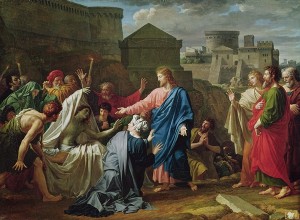
Jesus Resurrecting the Son of the Widow of Nain, Pierre Bouillon. Painting commissioned by Louis XVIII in 1817.
People must have been shocked.
It would be shocking today if someone were to reach into a coffin at a funeral, though that sometimes happens. But in Jesus’s time that was even more shocking: people believed that touching a dead body would make you impure. You would have to say special prayers and go through a ritual bath to clean yourself after touching someone who had died.
But Jesus is not afraid of the dead body. He is not afraid of death.
The truth is that our Lord hates death. “I hate them with perfect hatred. They have become my enemies.” That’s what the psalm (Ps 139) says. And that is how Jesus speaks to death.
Today, in this one case, in this one instance, Jesus has seen enough of death. Jesus himself is disgusted and angered by death — and he will not stand for it. Today, he reaches in, and as he touches the stiff and lifeless body of that widow’s boy, a miracle happens. It really is a miracle: God breaks the rules of nature and intervenes in people’s lives. And this man — this man who was not only dead but actually being carried out on a stretcher to be buried in the cemetery — this widow’s boy sits right up.
Jesus says, “I say to you, arise!” He calls to him, just like he calls to us. And the Gospel says, “And the dead man sat up, and began to speak. And Jesus gave him to his mother.”
What must the mother have felt? The Gospel doesn’t say.
What we are witnessing here today is a resurrection. A resurgence of life from the grave. Jesus defies death and rejects death and defeats death. The touch of his hand and the sympathy Jesus felt with the widow and her loss showed how much he loved her. But it also shows his love for us. Because our Lord wants to free you and he wants to free me from the power of sin. He wants to free us from anxiety and fear and all kinds of corruption. He even wants to free us from death itself. He wants to, and he can!
Look again: Jesus just says this simple word of command – “Young man, arise” – and the man is restored to life, his body is healed, and his soul was made whole and free and healthy again as well. That can happen to you, too.
A side note: this miracle took place near Mount Tabor, and that’s next to Mount Gilboa. Near Gilboa is the spot where the prophet Elisha raised another mother’s son back to life. That’s in the Second Book of Kings. (2 Kings 4:18-37)
And in the first reading today we saw the propjet Elijah do the same thing for a widow and her son in the region of Sidon, near the coast. The people in the crowd knew these stories. So in today’s Gospel they shout, “A great prophet has arisen among us!”
They were right, but only partly. Jesus is a prophet, the greatest of prophets. But Jesus is also greater than any prophet, because he is God. Jesus is Lord. And Jesus heals of his own power. When he touched that dead son, Jesus claimed a dead man as his own. Death had seized this widow’s son, but Jesus restored life. Because Jesus is Lord of the living.
Saint Paul says, “Christ, being raised from the dead, dies no more; death has no more dominion over him.” (Rom 6)
What happened to the son of the widow of Nain will happen to us. And what did we sing today in the Palm?
“I will praise you, Lord, for you have rescued me.
I will extol you, O LORD, for you drew me clear
and did not let my enemies rejoice over me.
O LORD, you brought me up from the nether world;
you preserved me from among those going down into the pit.” (Ps 30).
Those are powerful words. And they aren’t just powerful; they’re true.
***
Now, it’s interesting that the Church gives us this Gospel on a sunny day in June. Here it’s summer, and the sky is blue and the grass and leaves are green. So why do we get this Gospel? Why does God give us today the story of the widow of Nain?
Because this Gospel is not about death, it’s about resurrection. And it’s not about the resurrection of one widow’s son, it’s about the resurrection of all.
At every Sunday Mass, we say the Creed: the profession of faith. And you say, “I believe in one God” — every Sunday. And finally you get to the line, “I look forward to the resurrection of the dead, and the life of the world to come.” Those are the very last words of the Nicene Creed — the resurrection! The resurrection not only of Jesus himself, and not only of this boy or that man, but the resurrection of all; the great resurrection of everyone who has fallen asleep in Christ.
“Believe in me and you will have eternal life, and I will raise you up at the last day.”
“I came that you may have life, life in abundance.”
Sound familiar?
These are the words of our Lord. And he speaks to every widow in the church, and everyone who has lost children, and every single one of us, because every one of us must face death, even on a sunny summer day.
As the old hymn says:
Now the green blade rises from the buried grain,
Wheat that in the dark earth many years has lain;
Love lives again, that with the dead has been:
Love is come again, like wheat that springs up green. (John M.C. Crum, 1928.)
And to that we reply: Yes Lord, I believe. I believe that you are Lord. I believe that you are the Christ, and that death has no power over you. I say and I believe with the whole Church: “I look forward to the resurrection of the dead, and the life of the world to come.”
And the good news is: that resurrection is here, now.
The source of life and the font of all life is coming to us from the altar. He comes to us here — not just in “the great by-and-by,” not just at the end of time — but now.
Because our Lord also said these words:
“I am the living bread. If you eat this bread you will never be hungry again, because if you eat this bread you will live forever.”
At Mass, Jesus is made present under the appearance of bread. He comes to us from the altar. And when we receive the Lord in our bodies we feel and we know that he is the Lord of life.
He is our Lord. We are a Church of life.
We come together on a summer Sunday to rejoice in life — and to revel in our resurrection.













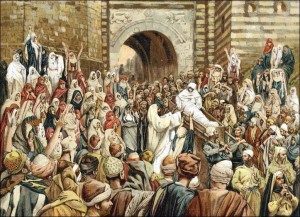
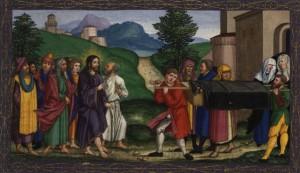
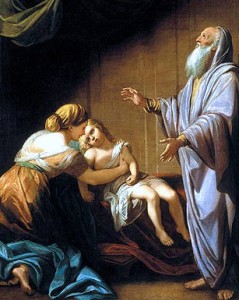
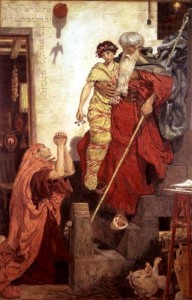
Comments - No Responses to “Do not weep”
Sorry but comments are closed at this time.